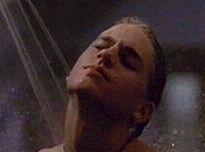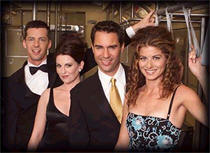 |


|
|
|
|
By Jesse Monteagudo
The late Craig Rodwell, the politically-correct proprietor of New York City's Oscar Wilde Memorial Bookshop, placed Kramer's book under the counter, along with other "undesirable" books. Kramer himself was ostracized by gay society in both Manhattan and Fire Island, and it was only when Kramer re-emerged as an AIDS activist in the 1980's that he was taken in by a now-repentant gay community. What did they do? Though both Dancer from the Dance and Faggots have their literary faults, activists and bookstore owner alike saw in those novels a gay world closer to the ravings of an Anita Bryant or a John Briggs than to the hopeful dreams of post-Stonewall groups like the GAA. To Holleran and Kramer (and Rechy), gay urban life was a dystopia of promiscuous sex, rampant drug use, superficial relationships and political apathy. Though not all of us lived that way in 1978, there were many men in both Manhattan and Fire Island at the time who resembled Holleran's Malone or Kramer's Fred Lemish. Both Holleran and Kramer wrote about their community the way they saw it, warts and all, and they were not beholden to some activists' standard of political correctness. Twenty-two years later, both Dancer from the Dance and Faggots continue to entertain millions of readers, while their critics have long been forgotten.
Homophobia remains a fact of life, and there is still a place for individuals and groups whose job it is to denounce lies and libels against our community. I appreciate the "GLAAD Alerts" that the Gay & Lesbian Alliance Against Defamation publish each week, and am glad that this watchdog group exists to protect us against our enemies. Even so, I believe that GLAAD would be a much better group if it learned to lighten up sometimes. After all, one person's homophobic nightmare is another person's clever satire or brilliant character study. There is nothing wrong with negative gay characters on television or the cinema; just as long as there are positive gay characters around to counter them. There are literally dozens of television programs, motion pictures, stage plays and recordings that portray various versions of lesbian and gay life. They range from the horrible to the exemplary, yet there are self-appointed critics who seem willing to attack each and every one of them. Queer as Folk, England's award-winning mini-series, was blasted for its promiscuous characters and its sex-drugs-and-disco portrayal of gay life; precisely the same charges hurled at Holleran and Kramer over two decades ago. Jack, the swishy character in TV's Will and Grace, is "too gay"; Will himself is "not gay enough"; and Survivor's Richard Hatch is the wrong kind of gay. And so it goes. There are more pressing things to worry about in life than the way a particular TV show handles its gay characters. If I don't like a particular program, I just don't watch it. I personally think Queer as Folk is an excellent show, even if C1TV censored it to protect American sensitivities (that's why I ordered the video).
There are radio and television personalities who are dangerous and demand our attention: D. James Kennedy, Rush Limbaugh, and Laura Schlessinger, just to name a few. But let's not get hysterical over the fact that the "Ambiguously Gay Duo" will always be ambiguous; that Christopher Lowell is the biggest flamer since Mrs. O'Leary's cow; or that the bitchy queens on "Fire Island" are bitchy queens. Their shows exist to entertain; and any attempt to enlighten or educate is only coincidental. The fact there are so many queer characters on TV is cause enough to celebrate; whether they be "too gay" or "not gay enough". |

© 1997-2000 BEI
 BBC's Queer as Folk is facing the same criticism sparked by Dancer from the Dance and Faggots in 1978, namely that gays are being portrayed as promiscuous, party boys
BBC's Queer as Folk is facing the same criticism sparked by Dancer from the Dance and Faggots in 1978, namely that gays are being portrayed as promiscuous, party boys  NBC's Will and Grace also have faced criticism for not being gay enough with its storylines
NBC's Will and Grace also have faced criticism for not being gay enough with its storylines